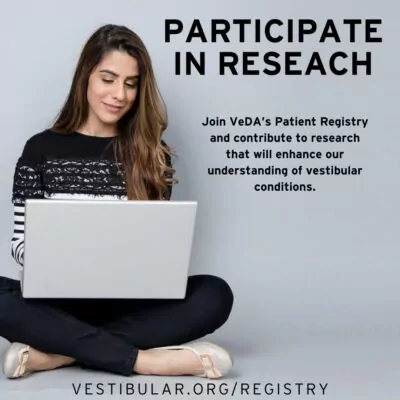
The Vestibular Disorders Association and NORD® Launch Natural History Study of Vestibular Disorders
Research study is open to participants worldwide to advance understanding and treatments for rare diseases causing dizziness, vertigo, and imbalance.
Today, the Vestibular Disorders Association (VeDA) and the National Organization for Rare Disorders (NORD) launched a study with global reach to research vestibular disorders, which cause dizziness, vertigo, and imbalance. Most vestibular disorders currently have no cure.
The new study, the Dizziness, Vertigo & Imbalance Patient Registry, creates a platform for patients around the world to share information about vestibular disorders. Its purpose is to build an international resource to be used by scientists in future research. Vestibular disorders affect the balance organs of the inner ear and brain and occur in approximately one out of every three adults over age 40. Vestibular disorders are difficult to diagnose, and many patients see 3-5 specialists before receiving a diagnosis. Many people remain undiagnosed, and some are told that their symptoms are “all in your head” or just due to stress. In addition to the physical, mental, and emotional challenges faced by patients and their loved ones, the lack of coordinated care results in unnecessary medical costs.
“The success of the registry is dependent upon community participation. Our goal is to enroll as many patients, or their parents or legal guardians, as possible,” said Dr. Habib Rizk, VeDA’s Board President and the Principal Investigator for the registry.
The Dizziness, Vertigo & Imbalance Patient Registry is a natural history study that consists of electronic surveys to collect information about the patient experience and disease progression. Patients, or their caregivers or guardians, can enter information from anywhere in the world. The data is confidential and stored securely in the IAMRARE online portal. VeDA may share the data with individuals or institutions conducting research or clinical trials, as approved by the study’s governing board which includes scientists, doctors, and patient advocates.
VeDA is launching the study in collaboration with NORD, an independent nonprofit that built its natural history study platform as part of its mission to help identify and treat all 7,000 rare diseases. VeDA is a member of NORD and the two organizations work together to eliminate the challenges that rare disease patients face.
“This new study has tremendous promise to build strong partnerships and engage the patient community to address current knowledge gaps for vestibular disorders. NORD is thrilled to be a part of driving research and innovation-based outcomes for all the families in the vestibular community,” said Janine Lewis, Director of Research Operations, NORD.
For more information, visit vestibular.org/registry.
About the Vestibular Disorders Association (VeDA)
VeDA is the leading international organization that supports people with vestibular disorders that affect the inner ear and parts of the brain that control balance by connecting them to healthcare specialists and support networks, and promotes awareness of the vestibular patient experience through research and advocacy.
About National Organization for Rare Disorders, Inc. (NORD®)
The National Organization for Rare Disorders (NORD) is the leading independent advocacy organization representing all patients and families affected by rare diseases in the United States. NORD began as a small group of patient advocates that formed a coalition to unify and mobilize support to pass the Orphan Drug Act of 1983. Since then, the organization has led the way in voicing the needs of the rare disease community, driving supportive policies, furthering education, advancing medical research, and providing patient and family services for those who need them most. Together with over 300 disease-specific member organizations, more than 15,000 Rare Action Network advocates across all 50 states, and national and global partners, NORD delivers on its mission to improve the lives of those impacted by rare diseases. Visit rarediseases.org.
